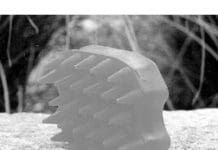Preparing Your Dog to Live With Kids
We've all seen similarly sensational headlines. In the article that follows such an alarming title, there's usually a quote somewhere about the tragic attack being unprovoked and totally unexpected. Yet dogs rarely attack without provocation, and in most cases the offending dog has been sending signals for quite some time that he was not comfortable with the presence of the child. If the parents had been better educated about dog behavior, and had been paying better attention, the tragedy quite likely could have been averted through proper management of child/dog interactions.
Holistic Help For Everything
I am new to alternative medicine for pets, and would like to share my experience so far. I have two dogs, a six-year-old Golden Retriever and an eight-year-old German Shepherd. Both have benefited from holistic care. It started with Riker, my Golden Retriever. I got him as a rescue at eight weeks of age. He had kennel cough and almost didn’t survive. My allopathic vet helped me nurse him through it, and he has been healthy since. I trained him in obedience; Riker loves to work and will do anything to please.
Whole Dog Journal Reviews “Dry Shampoos” and “Waterless Baths”
I don’t want to admit that I am lazy – but I am very busy – and dog baths sometimes have a way of slipping toward the bottom of the priority list. I have occasionally picked up one or more of the several “dry shampoo” or “waterless bath” products on the shelves of my local pet supply store and contemplated trying them out. I always told myself that they had to be too good to be true, and placed them back on the shelves. So when Whole Dog Journal decided to test these dog cleaning and coat conditioner products, I leaped at the chance, only to confirm what I had suspected all along.
Out For Blood
If your dogs are fighting, and are causing severe damage to each other – or one dog is causing severe damage to another – I’m sorry to say that you are dealing with the most difficult of all canine behavior problems, the one with the worst possible prognosis. Your options are extremely limited, because the treatment really should have happened when the dog was 4 1/2 months old, which is when dogs normally learn bite inhibition.
Questioning Vaccinations
Regarding your recent article on vaccination - thank you for confirming my belief that its the excessive challenging of the dog’s immune system that is responsible for so many auto-immune disorders. I am a non-practicing LVT in New York state and I have three dogs, two of whom have autoimmune disorders. I used to vaccinate religiously, and even brought the vaccines home to administer them.
How to Make Dog Grooming Enjoyable
When Emma, a German Shepherd mix with magnificent, mule deer ears, jumps out of the car after being driven home from a particularly hard run on the trails or mucky outing at the beach, she immediately trots into the bathroom and waits for her bath. During her soaping and rinsing, her owner sings and tells her stories. Cheeky squirrels are given a run for their money by fleet, wily dogs. Cats are put firmly in their place by commanding, resourceful dogs, and humans are rescued from various perils by brave and sagacious dogs (all the dogs bear a striking resemblance to Emma, of course).
Answers from Experts – 05/99
Is the grain from a beer-brewing kit safe for dogs? We feed our Scottie a natural diet rich in veggies, grains, fruits and white meats. I make beer. May the distillers grains be used, in moderation, in her feed and snack crackers?In the first part of the brewing process, you cook malted barley and cornstarch in water for 90 minutes. When the fluid is strained off for beer making, the “brewer’s grain” is discarded or fed to cattle. Is it appropriate for use in dog biscuits and as part of a home-prepared natural diet?
Treating Your Dogs’ Injuries Holistically
No matter how careful you are with your dog's everyday health needs, it's in his nature to be incautious and inquisitive. And that sometimes results in injury. Odds are, it's just a matter of when. However, your conviction to treat your dog with natural remedies is put to a real test when you are faced with an emergency. Whether your dog is severely injured in an accident or scraped and cut from a fight, your first reaction should be to remain calm, remember what you know, and think holistically. Just as you plan and prepare your dog's daily meals and training, advance planning and preparation for the unthinkable accident may help save your dog's life during the critical time between the beginning of the emergency and access to veterinary care.
Massaging Your Dog Promotes Circulation and Well Being
Massage is a broad discipline that includes Swedish, Western, and sports massage techniques to name only a few. This series on canine massage will discuss several methodologies, but will begin by describing one of the basic Swedish massage movements and its physiological effects and benefits. Swedish massage has its origins in a system devised by Pehr Henrik Ling, a Swedish physiologist and gymnastics instructor who is considered the father of Swedish massage and also the father of physical therapy.
Appreciation Day
This is just a quick note to let you know how delighted I am with Whole Dog Journal. I have ordered and received all the back issues, and am still working my way through them. (I already have a holistic veterinarian and use veterinary chiropractic services occasionally.) I also faithfully cook for by two blessedly healthy dogs. I have been following the discussions on dog training with great interest, and am now curious: How are service dogs trained? How are the dogs in government service (customs, drugs) trained?
Be Cautious While Tying Your Dog in the Backyard
I was trying to be a responsible dog owner. We lived in a rural area of Northern California, in a house with no fenced yard. My boyfriend's Irish Setter had recently been shot and killed while chasing a neighbor's goats. A hard lesson to learn, and one I wasn't about to repeat. So when we were leaving the ranch for a day I insisted we tie up our recently acquired St. Bernard, Bear. We tied him to a tree, made sure he had access to plenty of water and shade and was nowhere near a fence that he could climb over. Confident that we had done the right thing, we drove off.
Answers From Experts 06/99
I own two beautiful Rottweilers, a male and a female. They are uncle and niece. I’ve had the male from birth; he’s now four years old, has the most outstanding personality, and his temperament is excellent. He gets along with everyone, he’s obedience trained, and there just isn’t enough I could say about him. A couple of years ago I decided to purchase his niece, a neutered female. She is also obedience trained. Initially, the two got along as if it were meant to be.














